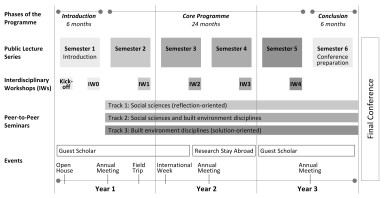Qualification Programme
Aims
The qualification programme complements the research training group’s scientific goals. It includes 12 funded doctoral researchers and 9 associated doctoral researchers. Additionally, 2 postdoctoral researchers have opportunities for qualification and career advancement. The exceptional interdisciplinary composition of the team of supervisors reflects the empirical focus of the programme. It covers the scientific approaches needed to fully address the outlined challenges of urban future‐making.
The qualification programme is tailored to support the PhD projects in an innovative way by organizing the programme into three tracks. These tracks serve both as a conceptual tool for structuring research interests and as an organizational framework for our disciplinary and interdisciplinary dialogues. The participating researchers of each track assume rotating responsibility for curatorship of collective activities over the span of the 3-year programme.
Structure and timeline
The qualification programme follows a structured timeline, consisting of an introductory semester, a core programme development phase, and a final wrap-up phase.
In the introductory semester, a kick-off meeting fosters connections among researchers, postdoctoral researchers, and supervisors. The meeting sets expectations for the coming 3 years and establishes joint supervision for doctoral researchers. Throughout this semester, doctoral researchers organize their topics and agree on supervision with scholars. A collective seminar at the end finalizes joint supervision and presents research topics.
The core development phase spans 24 months (semester 2 until semester 5) and involves individual and collective research activities in the three tracks. Plenary and group activities, interdisciplinary workshops, and a public lecture series facilitate discussions across tracks and disciplines. Formative activities enhance research skills and individual profiles. Internationalization, networking, and research-practice exchanges occur during this phase.
The final semester, the wrap-up phase, allows doctoral researchers to concentrate on completing their dissertations. Formative activities are reduced to support the completion of work and future career placements. The semester includes an interdisciplinary workshop and a final conference with international outreach.

Activities
The qualification programme encompasses three types of activities: ‘collective and peer-to-peer activities’, ‘skill-building activities’, and the ‘internationalization, research-practice, research-outreach’ cluster. Collective activities such as research colloquia and workshops include the whole group of researchers, encouraging transversal and interdisciplinary dialogues. Peer-to-peer activities and smaller working groups are directly related to the research tracks and allow for in-depth disciplinary exchange. Skill-building activities support researchers’ individual profiles, disciplinary interests, and timely progress. The ‘internationalization, research-practice, research-outreach’ cluster helps early-career researchers expand their networks within and beyond academia, facilitating future career placements and practice opportunities.